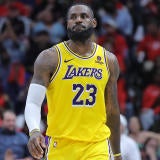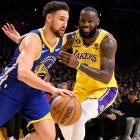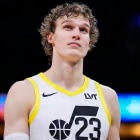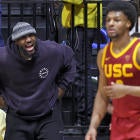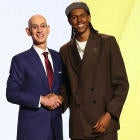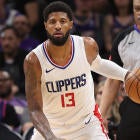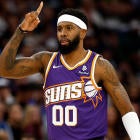
The 2024 NBA Draft is in the books with the completion of the second round Thursday. The biggest name called was at No. 55 when the Los Angles Lakers selected Bronny James. It was reported on ESPN by Bob Myers that James' agent, Rich Paul, was telling teams that drafted before the Lakers at 55 that Bronny would go to Australia to play if anyone else took him.
Second-round picks are fliers. The vast majority of them don't pan out. But there are often a few that pop. Nikola Jokic went in the second round. So did Draymond Green, Marc Gasol and Manu Ginobili. We shall see if anyone from the 2024 class, which is widely considered to be pretty weak, breaks out unexpectedly.
Even with the first-rounders, we won't be able to fully gauge the success or failure of a particular pick for a while, but we can make some educated guesses as to how this might play out over time.
And so, with the caveat that this could all look very different with the benefit of hindsight and with the information we have at our disposal, here are some NBA Draft winners and losers.
Winner: Bronny James
When you get drafted into the NBA as a 6-foot-1 guard who averaged 4.8 points over 25 college games after surviving sudden cardiac arrest, you've won. Bronny comes off like a poised and mature young man. He's handled the spotlight of being LeBron's son with real class and humility. This is a great day for him.
Now, LeBron can say all he wants that he had nothing to do with this and "reports" can come out that Anthony Davis was "really impressed" with Bronny's workout, but let's be honest about this: Bronny would not have been taken by the Lakers, or probably any other team, if he wasn't LeBron's son.
So they got their way and I believe LeBron has earned that level of sway. Remember, there is nepotism all over the NBA, and all sports leagues and businesses for that matter, when we're talking about the people wearing suits. Let's not get too high and mighty because an athlete has earned this position of power. Woj is right on with this:
“People talking about nepotism. The NBA is full of nepotism. The ownership level, front offices, coaching. I don't want to hear about it all of a sudden because Bronny James' father plays for the Lakers. It is rampant in this league” -Woj on ESPN pic.twitter.com/rjBP94PwkD
— Ahmed/The Ears/IG: BigBizTheGod 🇸🇴 (@big_business_) June 27, 2024
Just a few examples: Kirk Lacob, son of Warriors owner Joe Lacob, is currently Golden State's executive vice president of basketball operation. Dallas Cowboys owner Jerry Jones has three children: One is the Cowboys' chief operating officer, executive vice president and director of player personnel; another is the executive vice president and chief brand officer; the other is chief sales and marketing officer. Suffice it to say, these are not isolated examples.
Rich and powerful parents putting their kids on third base without them having to actually hit the triple is a time-honored tradition. So save the nepotism talk unless you're going to be outraged by all of it. Now, for what it's worth, I'm not sure if I were Bronny, as a young man trying to earn the respect of my peers, that I would want to get into the league this way. But that's just my own feelings, and that's a separate conversation anyway.
The bottom line is a lot of people think Bronny can actually play. We'll see. He has his opportunity.
CBS Sports Analysis ...
As expected, the Lakers unite LeBron James with his eldest son, Bronny, pairing the two in purple and gold. Bronny struggled last season with USC after suffering sudden cardiac arrest last summer and beginning the season recovering from the incident. He's a toolsy defender with a high IQ who plays hard and smart, though, and in time I think we'll find that this developmental pick was more than just ceremonial to make "The King" happy. Grade: B
Winner: LeBron James
Listen, nepotism is always kind of hard to stomach when it's thrown in your face (even though, again, it's an issue all over the place, not just in this specific case), and in some ways, it could be argued that LeBron has only made it harder for Bronny to earn the respect every young athlete craves by ushering him to the Lakers through his power and influence.
But LeBron, assuming he doesn't leave in free agency, is going to be on an NBA court with his son. That has never happened before. LeBron will literally be the only father in the entire existence of the world to experience that feeling. That automatically makes you a huge winner, as does the fact that he, along with his wife Savannah, appears to have raised a thoughtful and humble young man in Bronny, who could so easily have become the entitled type.
By all accounts, Bronny is a head-down worker with realistic ambitions relative to his own talent and independent of who his dad is. That's a major credit to LeBron as a father, because raising good kids is hard enough when the whole world isn't watching.
Winner: Lakers
So the Lakers get to keep their superstar -- who just so happens to be a free agent and can dangle the threat of leaving over the franchise's head -- happy by drafting his son, but the real win was when Dalton Knecht fell into their lap on Wednesday. Knecht, the SEC player of the Year who was universally projected to go inside the top 10, dropped all the way to No. 17 where the Lakers scooped him up. The Lakers have needed to address their shooting for basically the entire tenure of LeBron James, and they ended up with probably the best shooter in the draft.
Rob Pelinka on Dalton Knecht: “We would have never imagined a player as skilled and perfect for our needs would be there [at 17].” Pelinka added that LAL had Knecht ranked in its top 10 on their draft board. pic.twitter.com/Ax1ieyWjLO
— Dave McMenamin (@mcten) June 27, 2024
CBS Sports Analysis ...
This is an absolute no-brainer, someone whom I would have taken in the top seven. Big time scorer, big time shot-maker. He's not just a shooter, but he can run off screens and be a primary domino and unlock playbooks. For JJ Redick, a shooter himself, I like the coach-player fit because Redick will know how to use him. Grade: A+
Loser: Dalton Knecht
This is a tough call to make because in many ways this couldn't have worked out better for Knecht, who, rather than ending up on the Hornets or the Blazers, gets to cut his NBA teeth as a likely rotation player for a Lakers team with eyes on competing for a title. A rookie shooter taking passes from LeBron James and instruction from one of the best shooters and off-ball movers in history in JJ Redick? It's a dream.
What's not a dream is potentially losing in the neighborhood of $16 million -- the difference in slotted salary between the No. 6 overall projection Knecht received in our CBS Sports mock (most mocks had him right in this range) and the No. 17 slot where he landed.
As the No. 17 pick, Knecht is slated to make $18.5M over his first four years in the league. Had he gone No. 6, he would've been in line for over $34M. Playing with LeBron is cool and all, but give me the $16M. There is no guarantee that any draft pick, no matter where they go, will make it in the NBA. That said, the money on the first-round slot is guaranteed through the first three seasons.
That sounds shallow to prioritize money over basketball fit, but it's not. It's just life. When you've already accumulated your generational wealth, you can prioritize where you're playing. Until then, you might get one chance at securing you and your family's future. You want to maximize it. That doesn't mean anyone should feel sorry for a 23-year-old who just made himself $18 million despite receiving zero scholarship offers out of high school and having to go the junior college route, but the simple truth is that he expected he would make a lot more. And so did everyone else.
Winner: Knicks
It's been a huge couple of days for the New York Knicks, who traded for Mikal Bridges on Tuesday and then re-signed OG Anunoby on Wednesday. They also did some clever work in the draft when they traded one of their first-round picks to the Oklahoma City Thunder for five second-round picks in addition to selecting Pacome Dadiet with the No. 25 pick.
What's the big deal with those moves? Well, they're in a money crunch after signing Anunoby to a five-year $212M deal and trading for Bridges, who will be up for a big payday soon. By trading a first for five second-round picks, you don't have to pay the guaranteed slotted money to the first-rounder.
The Knicks then turned a couple of their second-round picks into Marquette points guard Tyler Kolek with the 34th pick after a trade with the Blazers. Our draft experts love the Kolek pick ...
New York traded for this pick from Portland and snatched one of the best values of the early second round in Kolek. He led college basketball in assists last season for Marquette and brings with him elite passing vision and dynamism as a disruptive downhill driver. He could be a valuable backup right away in New York, though some health questions lingered. Grade: A
But this is just as much about money management as it is Kolek. Second-rounders are not guaranteed, and the Knicks can get a lot more creative with how they pay those guys as their books clog up in the years to come. They can sign guys for the minimum, or use the new second-round pick exception (this basically allows teams to sign second-round picks to three- or four-year deals without using the mid-level exception), or you can give them two-way contracts. In other words, there's a lot more options to control their finances in the future.
Also, Dadiet, the 25th pick, is seen by most as a draft-and-stash player, meaning he'll stay in France for some more time while New York retains his rights but doesn't have to pay him right away. Assuming this happens, the Knicks went from having to roster and pay two first-round picks this season to not paying even one first-rounder and thus saving about $5.5M. When you're as close as the Knicks are to what most assume will be a second-apron hard cap of around $189M with multiple spots left to fill on their roster, finagling that kind of money out of the couch cushion is a big deal.
Winner: Zaccharie Risacher
If you go No. 1 in an NBA Draft, then you're a winner. Risacher benefits from being in this particular class; it's not often that a 3-and-D wing goes first overall. Risacher wasn't regarded as the consensus top pick through most of the mock season, but he lands in the with the Hawks, who may be entering into a rebuild by the time this offseason concludes if they end up trading Trae Young or Dejounte Murray, or even both. Oh by the way, Risacher just secured himself about $57 million over his first four seasons in the league.
CBS Sports Analysis ...
It's solid but unspectacular, but that's what you expect in this draft. Risacher is a 3-and-D prototype, which you'd hope for more from a No. 1 overall pick, but that's what you're getting in this class. The better course of action would have been to trade down, but that option didn't seem to present itself to the Hawks. Grade: B
Winner: French Basketball
A year after French sensation Victor Wembanyama went No. 1 overall to the Spurs, the top pick in 2024 was once again a Frenchman in Zaccharie Risacher. The No. 2 overall pick, Alex Sarr, also comes from France, as does Tidjane Salaun, who went No. 6 overall to the Hornets. That's three of the top six picks for France. Not bad.
Loser: Memphis Grizzlies
Memphis clearly had eyes on Donovan Clingan, and it was even being reported that the Grizzlies were close to a deal to move up from No. 9 to take him. That would've been an incredible stroke of luck for Clingan, who was receiving legit talk as a potential No. 1 overall guy, to fall that far and be able to swing back. But they couldn't seal deal, and Clingan wound up going to Portland while the Grizzlies wound up with Zach Edey at No. 9. Maybe Edey ends up being really good. I just don't see it.
Winner: Blazers
If the Grizzlies are losers for missing out on Clingan, then the Blazers, naturally, are winners for landing him. There was credible talk of the Hawks taking him at No. 1. To get him at No. 7 is a gift on paper. You never know how it's actually going to work out, but you'll take this bet on a potential defensive anchor who can operate comfortably as a rolling finisher and short-roll playmaker.
Winner: Spurs
Having top-end perimeter defenders with on-ball force and multi-positional athleticism has become so important in the NBA. It's even better if you have an elite rim protector behind them. This blueprint just helped Boston win a title, and the Timberwolves rode it to the conference finals. San Antonio has Victor Wembanyama as a generational paint protector, and now it gets 6-foot-6 Stephon Castle with the No. 4 pick, whom Jay Bilas compared to Jrue Holiday for his physical defensive force.
After that, the Spurs traded the rights to their No. 8 pick, Rob Dillingham, to the Timberwolves in exchange for Minnesota's unprotected 2031 first-round pick and a protected 2030 first-round swap. This isn't to say Dillingham won't turn out to be really good (he's got some serious scoring upside, but he's tiny and might not ever be able to credibly defend), but for the Spurs, this is a longer-term play that opens up a lot more roster-building options as Wembanyama ages into a superstar.
If the Spurs become as good as they expect to be with Wembanyama, their own future draft picks will fall farther and farther down the board. So it becomes important to control other teams' picks, which may be better suited to land higher in the draft, to outfit your team with cheap rookie-contract support as payroll increases around the stars. In essence, the whole goal is to stay below the second-apron tax line, which is where so many roster-building avenues become closed off.
Our Sam Quinn laid out just how many of these picks San Antonio has managed to compile from other teams:
Most teams use draft night to build for the next few years. The Spurs, with Victor Wembanyama in tow, are taking a much longer view. Over the past few years, they have slowly assembled a deep war chest of draft picks well into the future. A 2028 pick swap with the Celtics. A 2030 swap with Dallas. Now, another 2030 swap as well as an unprotected pick from the Timberwolves in 2031. Throw in the 2025 and 2027 picks the Spurs have from Atlanta, the 2026 swap the Hawks owe them and the protected pick eventually coming from Chicago thanks to the DeMar DeRozan trade and suddenly, the Spurs are set up to control at least one of another team's first round pick in every draft from now until 2031 with the exception of 2029.
You might be thinking: How valuable could the Wolves' 2030 and/or 2031 pick(s) be considering how good of a team they have? Well, that's over a half-decade from now. It might actually be smarter to bet on good teams right now falling off five or six years from now than bad teams still being bad that far down the road. It's extremely hard to maintain excellence in the NBA. The more you bet on other teams' picks, the better your chances of a few of them turning up golden. The Spurs are putting more and more chips on the table.




